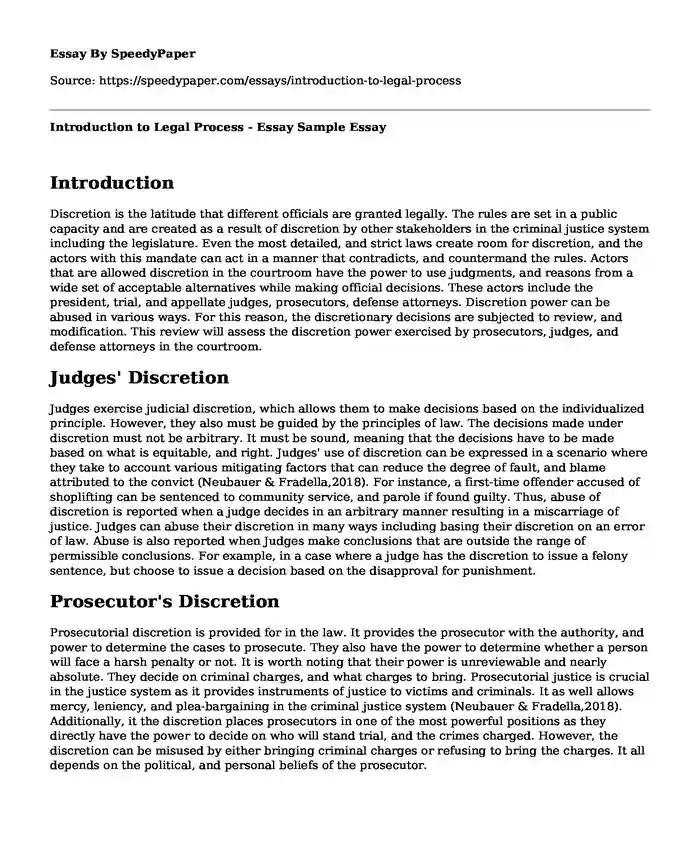
| Type of paper: | Essay |
| Categories: | Law |
| Pages: | 3 |
| Wordcount: | 628 words |
Introduction
Discretion is the latitude that different officials are granted legally. The rules are set in a public capacity and are created as a result of discretion by other stakeholders in the criminal justice system including the legislature. Even the most detailed, and strict laws create room for discretion, and the actors with this mandate can act in a manner that contradicts, and countermand the rules. Actors that are allowed discretion in the courtroom have the power to use judgments, and reasons from a wide set of acceptable alternatives while making official decisions. These actors include the president, trial, and appellate judges, prosecutors, defense attorneys. Discretion power can be abused in various ways. For this reason, the discretionary decisions are subjected to review, and modification. This review will assess the discretion power exercised by prosecutors, judges, and defense attorneys in the courtroom.
Judges' Discretion
Judges exercise judicial discretion, which allows them to make decisions based on the individualized principle. However, they also must be guided by the principles of law. The decisions made under discretion must not be arbitrary. It must be sound, meaning that the decisions have to be made based on what is equitable, and right. Judges' use of discretion can be expressed in a scenario where they take to account various mitigating factors that can reduce the degree of fault, and blame attributed to the convict (Neubauer & Fradella,2018). For instance, a first-time offender accused of shoplifting can be sentenced to community service, and parole if found guilty. Thus, abuse of discretion is reported when a judge decides in an arbitrary manner resulting in a miscarriage of justice. Judges can abuse their discretion in many ways including basing their discretion on an error of law. Abuse is also reported when Judges make conclusions that are outside the range of permissible conclusions. For example, in a case where a judge has the discretion to issue a felony sentence, but choose to issue a decision based on the disapproval for punishment.
Prosecutor's Discretion
Prosecutorial discretion is provided for in the law. It provides the prosecutor with the authority, and power to determine the cases to prosecute. They also have the power to determine whether a person will face a harsh penalty or not. It is worth noting that their power is unreviewable and nearly absolute. They decide on criminal charges, and what charges to bring. Prosecutorial justice is crucial in the justice system as it provides instruments of justice to victims and criminals. It as well allows mercy, leniency, and plea-bargaining in the criminal justice system (Neubauer & Fradella,2018). Additionally, it the discretion places prosecutors in one of the most powerful positions as they directly have the power to decide on who will stand trial, and the crimes charged. However, the discretion can be misused by either bringing criminal charges or refusing to bring the charges. It all depends on the political, and personal beliefs of the prosecutor.
Defense Attorney's Discretion
Lawyers in various fields have substantial discretion while pursuing the Client's goals. They undertake a client's task professionally and control the route to achieving better results in the courtroom. The discretion of attorneys allows them to challenge jurors, select witnesses of their choice, and chose evidence sources (Neubauer & Fradella,2018). Just like prosecutors, defenders can choose the case they want to pursue. However, the prosecutors' power is unreviewable and more authoritative. Defense attorneys can abuse their discretion powers in various ways. For instance, while pursuing a client's case, they can decide to rely on false sources of evidence, which will affect the case. They can as well dismiss a case while it is ongoing in the court.
References
Neubauer, D. W., & Fradella, H. F. (2018). America's courts and the criminal justice system. Cengage Learning.
Cite this page
Introduction to Legal Process - Essay Sample. (2023, Dec 16). Retrieved from https://speedypaper.com/essays/introduction-to-legal-process
Request Removal
If you are the original author of this essay and no longer wish to have it published on the SpeedyPaper website, please click below to request its removal:
- Free Essay on Civil Liability
- Summary on America's Private Prison System. Free Essay.
- Free Essay Explaining Lower Latino Violent Crime Rates than Those Committed by African Americans
- Police Subculture Essay Sample
- Essay Sample on Searches and Seizures Using Cell Phones
- Fictional Characters: Exploring World Perspectives in Crime Films, TV & Video Games - Essay Sample
- Citizenship: Rights, Privileges & Defense of a Nation - Essay Sample
Popular categories




